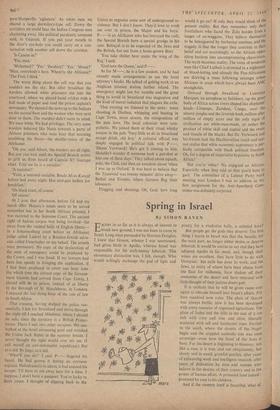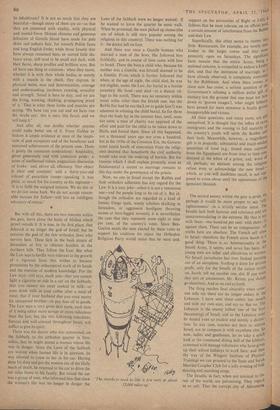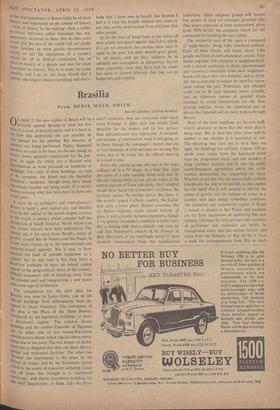Spring in Israel
By SIMON RAVEN EXCEPT in so far as it is always of interest to break new ground, I was not keen to come to Israel. Long since persuaded by Norman Douglas, I knew that Greece, whence I was summoned, had given birth to Apollo, whereas Israel was responsible for his arch-enemy Jehovah. This elementary distinction was, I felt, enough. Who would willingly exchange the god of light and poetry for a vindictive bully, a celestial bore?
But people get the gods they deserve. The first thing I learnt in Israel was that the Israelis, for the most part, no longer either desire or deserve Jehovah. It would be untrue to say that they have adopted Apollo in his stead; and, though their wines are excellent, they have little to do with Dionysus: but exile has done its work, and the Jews, so many of whom have been absent from the East for millennia, have shaken off their memories of the desert and have returned with little thought of their jealous desert god.
It is unlikely that he will be given cause ever again to obtrude himself into Israel's affairs. For here mankind now rules. The plain of Sharon was always fertile; now it has been developed with every resource of organised agriculture. The plain of Judea and the hills to the east of it are rich with corn and vine and olive, liberally scattered with tall and handsome trees. Further to the south, where the deserts of the Negev begin and the crippled umbrella tree was once sovereign—even here the hand of the Jews is busy. For the desert is beginning to blossom : not like a rose, it is true, and not ubiquitously, but slowly and in small, grateful patches, after years of exhausting work and intelligent research, after years of dedication by men and women who believe in the destiny of their country and in the power of human effort. A promised land indeed: promised by man to his children.
And if the country itself is beautiful, what of its inhabitants? It is not so much that they are beautiful—though many of them are so—as that they are crammed with vitality, with physical and mental force. Distant climates and generous infusions of Gentile blood have made for pale skins and auburn hair, for smooth Polish faces and long English limbs; while those Israelis that have always remained here, or moved little dis- tance away, still tend to be small and dark, with their fierce, sharp profiles and brilliant eyes. But all have one thing in common : when they move, whether it is with their whole bodies or merely with a muscle in the cheek, they express, in physical terms, ease and determination, courage and understanding, insolence, cunning, sexuality and strength. 'Israel is here to stay, and we are the living, working, thinking, propagating proof of it.' That is what these limbs and muscles are saying. 'We have run you out and we have run the Arabs out : this is ours, this Israel, and we will keep it.'
And after all, one doubts whether anyone could make better use of it. From Galilee to Sodom is ample evidence at once of the inepti- tude of past occupants and of the beneficent and sustained achievement of the present ones. There is gaiety (in conscious moderation): hospitality, given generously and with conscious pride: a sense of intellectual values, pugnacious discussion of books: and, above all, efficiency. 'Our object is clear and constant,' said a thirty-year-old colonel of parachute troops—speaking, it was plain, as much for his country as his regiment— 'it is to fulfil the assigned mission. We do this or we do not come back. We do not accept reason- able excuses for failure—still less an intelligent advocacy of retreat.'
* But with all this, there are two enemies within the gate, leave alone the hosts. of Midian which prowl outside it. It is true, in the first place, that Jehovah is no longer the god of Israel; but he remains the god of the few orthodox Jews who survive here. These lurk in the back streets of Jerusalem or live in obscure hamlets in the northern hills. They follow the Law. But what the Law says is hardly very relevant to the growth of a vigorous State that wishes to become prosperous by the unhampered work of its hands and the exercise of modern knowledge. For the Law says—still says, mark you—that you cannot light a cigarette or ride in a car on the Sabbath; that you cannot eat meat cooked in milk—or even drink milk in your coffee after a meal of meat; that if your husband dies you must marry his unmarried brother—or pay him off in goods. The Law says a very great deal more, each item of it being either more savage or more ridiculous than the last; but the two following anecdotes, famous and well-attested throughout Israel, will suffice to give its spirit.
There was the doctor who was summoned, on the Sabbath, to the orthodox quarter in Jeru- salem, that he might attend a woman whose life was in danger. Since the Laws of the Sabbath are waived when human life is in question, he was allowed to come to her in his car. Having done his duty and put the woman out of the likely reach of death, he returned to his car to drive the ten miles home to his family. But round the car was a group of men, who informed him that since the woman's life was no longer in danger the Laws of the Sabbath were no longer waived : if he wanted to leave the quarter he must walk. When he protested, the men picked up stones (the use of which is still very popular among the religious in this country). There was nothing for it : the doctor left on foot.
And there was once a Gentile 'Woman who married a man of the Jews. She followed him faithfully, and in course of time came with him to Israel. There she bore a child who, because his mother was a Gentile, was himself deemed to be a Gentile. From which it further followed that when, at the age of eight, the child died, he was not eligible, under the Law, for burial in a Jewish cemetery. He lived—and died—in a distant vil- lage to the north. There was no cemetery within many miles other than the Jewish one; but the Rabbi (for had he not the.Law to guide him?) was adamant in refusing the child burial. So for three days the body lay in the summer heat, until, none too soon, a man of charity was apprised of the affair and paid for the child to be taken down to Haifa and buried there. Since all this happened, not a thousand years ago nor even a hundred, but in the 1950s of the Common Era, the Govern- ment (amid howls of execration from the religi- ous) decreed that henceforth the civil authority would take over the ordering of burials. But for reasons which I shall explain presently, even so fundamental a matter as marriage remains to this day under the governance of the priests.
Now, no one in Israel except the Rabbis and their orthodox adherents has any regard for the Law. It is a sour joke—when it is not a venomous one—and the people long to be rid of it. But 'al- though the orthodox are regarded as a kind of lunatic fringe (pale, weedy scholars skulking in Jerusalem, or aggressive hooligans throwing stones at bare-legged women), it is nevertheless the case that they represent some eight or nine per cent. of the country's votes. Since Ben- Gurion needs the men elected by these votes to support his coalition (to reject the Orthodox Religious Party would mean that he must seek The monkeys used to like a few nuts at about 12,000 miles up.' THE SPECTATOR, APRIL 22. 1961 support on the extremities of Right or Left). it follows that he must tolerate, on an official level, a certain amount of interference from the Rabbis and their Law. Superficially, this often seems to matter very little. Restaurants, for example, are mostly non: kosher in the larger towns and stay Imre pentantly open on Saturdays. The significant facts remain that the entire Army, being 3 national concern, is compelled to endure a kosher, diet, and that the institution of marriage. as ! have already observed, is completely controlled by the Rabbinate. And when there comes. as there now has come, a serious question of the Government's refusing a million dollar gift f statuary (on the ground that one must not bow down to 'graven images'), what might hitherto have passed for mere nonsense is finally grovii insupportable and vicious. All these questions, and many more, are still unresolved. It is thought that the influx of mor6, 01 immigrants and the coming to full maturity the country's youth will settle the Rabbis and their hash. Meanwhile, however, a magnificent gift is in jeopardy; substantial and much-needed quantities of food (e.g., tinned meat captured from the Egyptians) are from time to time con- demned; at the whim of a priest; and, worst all, perhaps, an element among the religious refuse even to acknowledge the new Israel-- which, as you will doubtless recall, is not sell' posed to come about until the appearance of the (genuine) Messiah.
The second enemy within the gate is pride. Or perhaps it would be more proper to say righteousness'—in a strictly secular sense. The Israelis lack both humour and tolerance and are unaccommodating in the extreme. He that is not with them—one hundred per cent. with them—is against them. There can be no compromise: all truths here are absolute. The French sell aril's to Israel—therefore the French atom bomb is a good thing. There is no homosexuality in the Israeli Army, it seems, and never has been. All young men are sober and chivalrous to women. No Israeli parachutist has ever funked jumping out of an aeroplane. Nothing is done for Private profit, only for the benefit of the nation (coneon, Jacob, tell me another one, do). If you wont that sort of amusement, Mr. Raven, you should go elsewhere. And so on and so forth.
The thing reaches 'final absurdity when some' one tells me there are no longer cedars in the Lebanon. I have seen these cedars last month and with my own eyes, and say so. But no. The Lebanon is the enemy (albeit one of the least threatening) of Israel, and so the Lebanon most be denied even so modest and seemly a distinc- tion. In any case, tourists are here to admire Israel, not to compare it with anywhere else. So now, ladies and gentlemen, let us take a quick look at the communal dining hall of the kibbutz, crammed with teenage volunteers who have given up their school holidays to work here; and then (by way of the Wingate Institute of Physical Training) we can proceed to the Isaac and Sarah Married Couples' Club for a jolly evening of folk dancing and marching songs. The Israelis, in fact, when not inimical to the rest of the world, are patronising. They regard us as soft. That the corrupt city of Alexandria or the tired splendours of Rome might be of more interest and importance in the scheme of history —even of history in the making—than a rather Provincial hill-town called Jerusalem has not, aPParently, occurred to them. Nor do they seem aware that the rest of the world will not gladly suffer limitless or even partial inconvenience merely to suit the aspirations of a country which, for all its Biblical connection, has an effective history of a decade and was for years dependent on charity. This is to make my point roundly; and I do so, not fromill-will (for I admire and respect almost everything and every-
body that I have seen in Israel), but because I feel it is time the Israelis realised that, Jews or not, they are/no more exempt from criticism than other people'..
9/ So let t e Jews of Israel look to the follies of their pri 1 ts and guard against that hybris which, if I itjrf not mistaken, has undone them once or twice in the past. Let their deserts grow green,
--- by all means, and let their children be as splendid and courageous as themselves: but let them remember. since they have had the excel- lent sense to discard Jehovah, that they are no longer any god's choice.












































 Previous page
Previous page